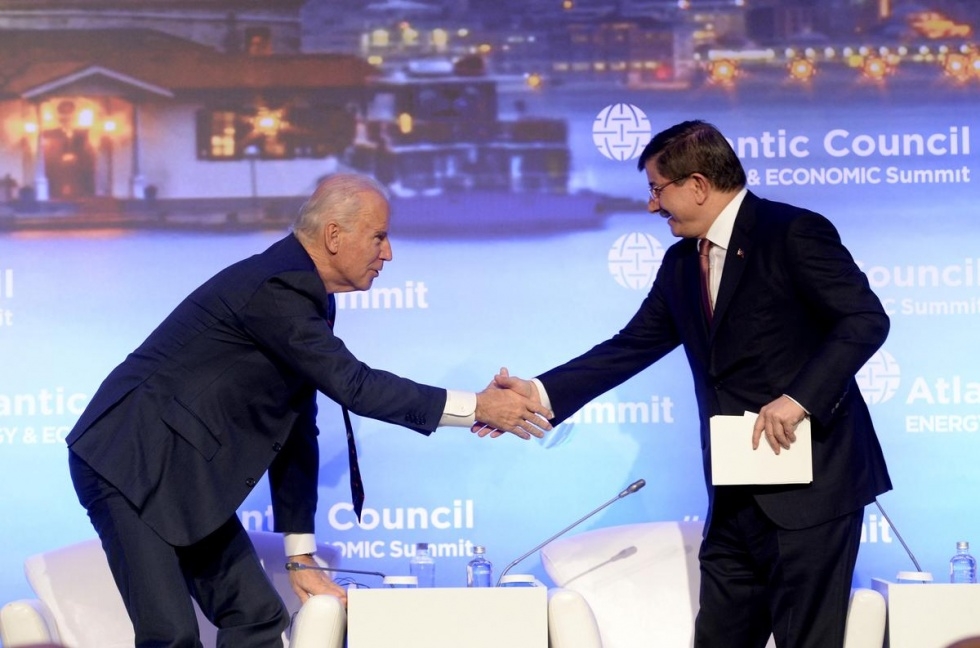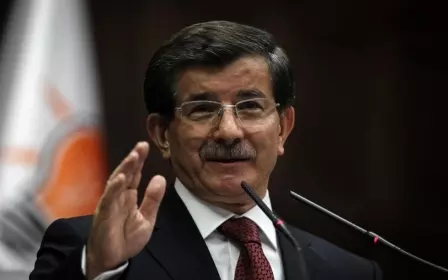Biden in Turkey to ease strains over Syria

US Vice President Joe Biden on Saturday meets Turkish President Recep Tayyip Erdogan aiming to ease strains over the crisis in Syria and persuade Turkey to step up its support for the coalition against Islamic State (IS) militants.
The trip to Istanbul by Biden, the highest ranking US official to visit Turkey since Erdogan won election as president after over a decade as prime minister, comes amid unusual tensions in the traditionally strong relationship between the two NATO allies.
Washington is frustrated by the relatively limited role played by Turkey in the fight against IS who have seized swathes of Iraq and Syria right up to the Turkish border.
Turkey in turn is upset that international focus has been on the threat of IS alone, feeling that the overall plight of Syrians is being ignored.
Turkey also feels that its contribution in hosting 1.6 million refugees from the Syrian conflict has gone relatively unrecognised, and Ankara is wary of supporting the Kurdish fighters battling IS.
Biden personally stung Erdogan last month by suggesting his policies in supporting Islamist rebel forces in Syria had helped encourage the rise of IS, a slight that prompted the president to warn his relationship with the US number two could be "history".
But Biden said after arriving in Istanbul that openness was a key part of the US-Turkey relationship.
"Friends don't let the other wonder about what they are thinking," said Biden.
US's 'highest priority' is defeating IS, not Assad
In talks late Friday with Prime Minister Ahmet Davutoglu, Biden agreed on the need to "degrade and defeat IS" as well as work to a "political transition" in Syria, the US administration said, without giving further details.
Turkey has been allowing a contingent of Iraqi peshmerga Kurdish fighters to transit Turkish soil to fight IS militants for control of the Syrian border town of Kobane.
But the Turkish government has also so far refused to allow US forces to stage bombing raids from the Incirlik air base in southern Turkey, forcing them to make far longer sorties from the Gulf.
Turkey has set several conditions for playing a greater role in the coalition.
It wants a clear coordinated strategy to overthrow President Bashar al-Assad, a major training and equipping programme for the opposition Free Syrian Army (FSA) and a security zone, backed by a no-fly area, to be set up in northern Syria along the Turkish border.
A senior US administration official told reporters ahead of the talks that both Turkey and the United States were in agreement on the need to do more to combat IS in both Iraq and Syria.
But the official conceded that while the United States was aiming for a transition in Syria that did not include President Bashar al-Assad, its "highest priority" was to defeat IS.
This puts Washington at odds with Turkey, which wants ousting Assad to be given the same strategic importance as defeating IS.
The US official acknowledged it would be "useful to have more access to Turkish facilities" to better help the forces combatting IS.
US military sources have in recent days expressed increasing confidence about the progress of the battle against IS militants fighting for the strategic Syrian border town of Kobane.
The top US envoy for the coalition, John Allen, told a Turkish newspaper this week that IS had effectively "impaled" itself on Kobane by pouring fighters into the town who could then be bombed by coalition war planes.
New Biden gaffe?
Biden warned that a concentration of powers under a head of state was "corrosive", in what some observers have interpreted to be a reference to Erdogan's presidency.
Speaking to an umbrella group of Turkish civil society groups known as the Checks and Balances Network, Biden noted that in the United States the three branches of power -- presidency, legislature and judiciary -- are equal in status.
"Our founders (of the United States) concluded that a concentration of powers was the most corrosive thing that can happen to any system," he said.
"We still believe that," he added.
Biden did not specifically refer to Turkey in his remarks open to the press ahead of a closed-door meeting, saying he was not in Istanbul to "proselytise".
But he added: "The best way to preserve freedom is not to have too much power concentrated in any branch of government."
Stay informed with MEE's newsletters
Sign up to get the latest alerts, insights and analysis, starting with Turkey Unpacked
Middle East Eye delivers independent and unrivalled coverage and analysis of the Middle East, North Africa and beyond. To learn more about republishing this content and the associated fees, please fill out this form. More about MEE can be found here.




